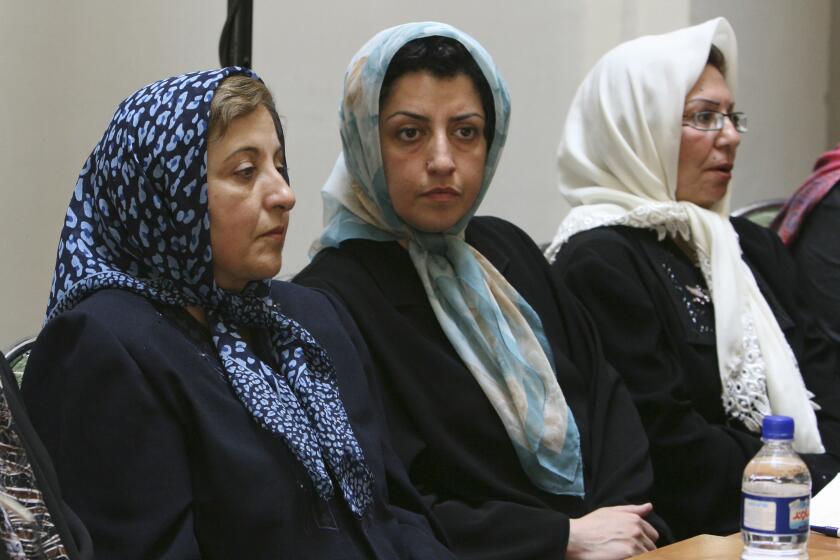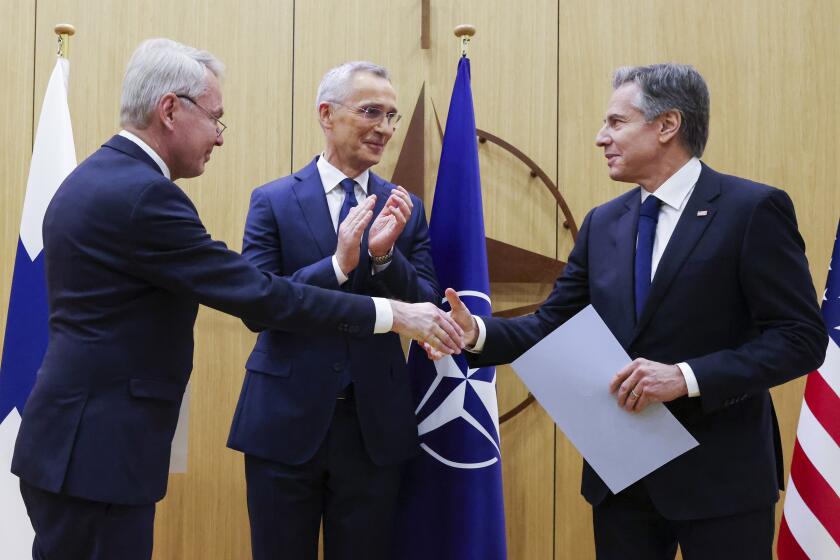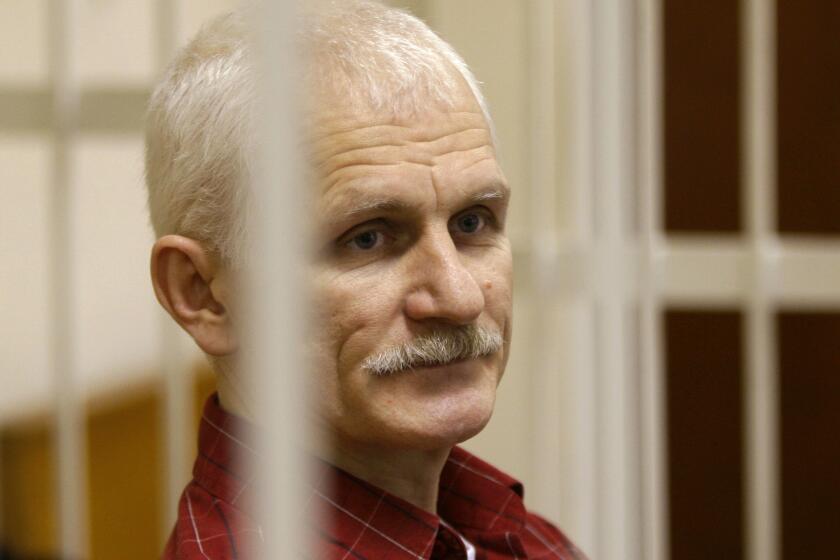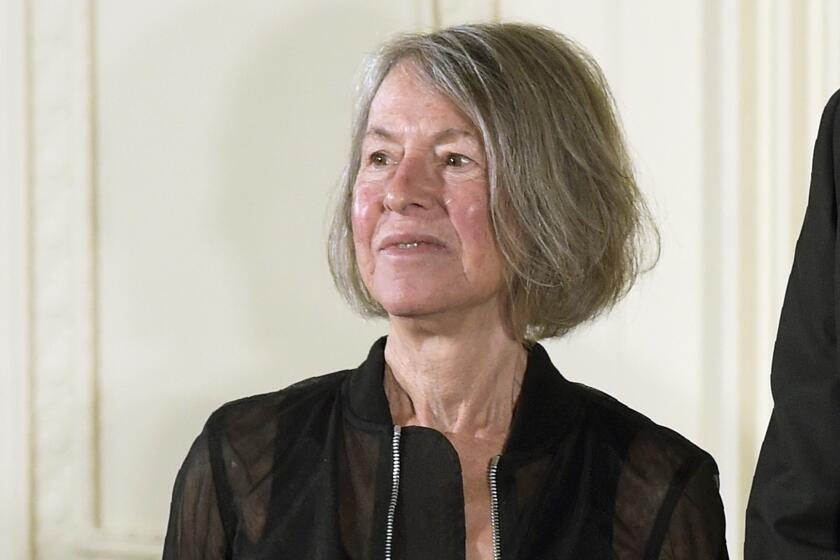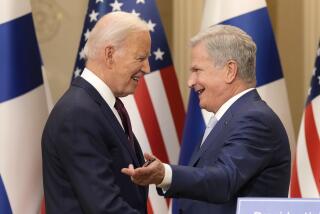Nobel Peace Prize winner and former Finnish president Martti Ahtisaari dies at 86
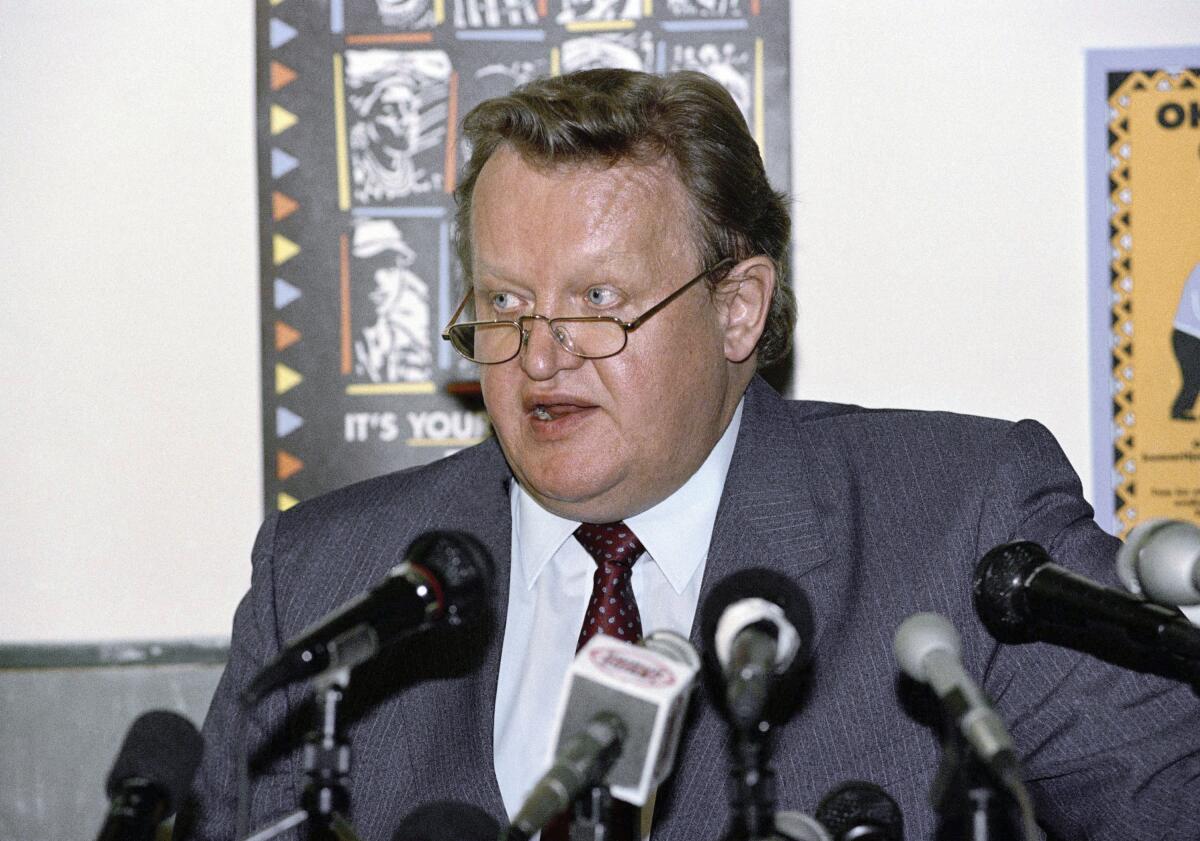
- Share via
HELSINKI — Martti Ahtisaari, the former president of Finland and global diplomat who won the Nobel Peace Prize in 2008 for his work to resolve international conflicts, died Monday. He was 86.
The foundation he created for preventing and resolving violent conflicts said in a statement that it was “deeply saddened by the loss of its founder and chair of board.”
In 2021, it was announced that Ahtisaari had advanced Alzheimer’s disease.
“It is with great sadness that we have received the news of the death of President Martti Ahtisaari,” Finnish President Sauli Niinisto said in a statement. “He was president in times of change, who piloted Finland into a global EU era.”
Niinisto described Ahtisaari in a televised speech as “a citizen of the world, a great Finn. A teacher, diplomat and head of state. A peace negotiator and a Nobel Peace Prize laureate.” Regular programming on Finnish public broadcaster YLE was interrupted for Niinisto’s speech.
Ahtisaari helped reach peace accords related to Serbia’s withdrawal from Kosovo in the late 1990s, Namibia’s bid for independence in the 1980s and autonomy for the Aceh province in Indonesia in 2005. He was also involved with the Northern Ireland peace process in the late 1990s, tasked with monitoring the IRA’s disarmament process.
Narges Mohammadi, an Iranian activist who has fought the oppression of women and campaigned against the death penalty, wins the Nobel Peace Prize.
NATO Secretary-General Jens Stoltenberg called Ahtisaari “a hero of peace, security and conflict prevention,” adding: “I admired his peace work in the Western Balkans.”
“President Ahtisaari committed all his life to peace, diplomacy, the goodness of humanity, and had an extraordinary influence on our present and the future,” said Kosovar President Vjosa Osmani. “He engraved the frame of our country, and his name will remain forever in the pages of the Republic of Kosovo’s history.”
European Commission President Ursula von der Leyen called him “a visionary” and “a champion of peace” on X, formerly known as Twitter. Former British Prime Minister Tony Blair said Ahtisaari had made a “vital contribution to the Northern Ireland peace process.”
When the Norwegian Nobel Peace Committee picked Ahtisaari in October 2008, it cited him “for his important efforts, on several continents and over more than three decades, to resolve international conflicts.”
Ahtisaari, who was Finland’s president for one six-year term — 1994 until 2000 — later founded the Helsinki-based Crisis Management Initiative, aimed at preventing and resolving violent conflicts through informal dialogue and mediation.
Amid the backdrop of the Russian invasion of Ukraine, historically neutral Finland joins NATO as the alliance’s 31st nation.
Born June 23, 1937, in the eastern town of Viipuri, which is now in Russia, Ahtisaari was a primary school teacher before joining Finland’s Foreign Ministry in 1965. He spent some 20 years abroad, first as ambassador to Tanzania, Zambia and Somalia and then to the United Nations in New York.
After that, he joined the U.N., working at its New York headquarters before heading the U.N. operation that brought independence to Namibia in 1990. Ahtisaari had become deeply involved in activities aimed at preparing Namibians for independence during his diplomatic tenure in Africa in the 1970s.
He was appointed as the special representative of Namibia by U.N. Secretary-General Kurt Waldheim in 1978, and is widely credited for leading the African nation to independence under his mandate as the head of U.N. peacekeeping forces there in the late 1980s.
The Namibian government was grateful for Ahtisaari’s work and later made him an honorary citizen. Namibian President Hage Geingob said on X that Ahtisaari was “a friend of the Namibian liberation struggle and a leading peacemaker who played through the United Nations a pivotal role in midwifing the birth of a new Namibia.”
The award to human rights advocates in Russia, Ukraine and Belarus comes as Russia’s war in Ukraine is well into its eighth month.
After returning to Finland in 1991, Ahtisaari worked as a Foreign Ministry secretary of state before being elected president in 1994 for a six-year term. He was the first Finnish head of state to be elected directly instead of through an electoral college.
Having lived abroad for so long, he came into the race as a political outsider and was seen to bring a breath of fresh air to Finnish politics. Ahtisaari was a keen supporter of the European Union and NATO, which Finland joined in 1995 and 2023, respectively.
His international highlight came in 1999 when he negotiated — alongside Russia’s Balkans envoy, Viktor Chernomyrdin — the end to fighting in the Yugoslav province of Kosovo. Ahtisaari also hosted President Clinton and Russian President Boris Yeltsin at a U.S.-Russia summit in Helsinki in March 1997.
Ahtisaari “had a great heart and he believed in the human being,” Niinisto said.
Start your day right
Sign up for Essential California for the L.A. Times biggest news, features and recommendations in your inbox six days a week.
You may occasionally receive promotional content from the Los Angeles Times.
“In his speech at the Nobel celebration, Ahtisaari said that all conflicts can be resolved: ‘Wars and conflicts are not inevitable. They are caused by humans,’” Niinisto said. ”There are always interests that war promotes. Therefore, those who have power and influence can also stop them.”
As president, Ahtisaari traveled abroad more widely than any of his predecessors. At home, he often appeared impatient and vexed by media criticism — he was clearly much more comfortable in international circles.
He declined to run for a second term in the January 2000 presidential election, saying he wanted to devote the time he would otherwise have used for campaigning to running the rotating EU presidency, which Finland held for the first time in 1999.
After the Finnish presidency, he was offered several international positions, including in the U.N. refugee agency, but decided instead to open his own office in Helsinki.
Louise Glück, former U.S. poet laureate and Nobel winner who wrote with ‘austere beauty,’ dies at 80
Louise Glück, the witty, candid and uncompromising former U.S. poet laureate who won the Nobel and Pulitzer prizes, has died at age 80.
In May 2017, Ahtisaari stepped down as chairman of the Crisis Management Initiative he founded in 2000 but said he would continue working with the organization as an advisor. He was replaced by former Finnish Prime Minister Alexander Stubb, who is now running for president.
“Perhaps now more than ever, the world needs people like him,” Stubb said of Ahtisaari on X.
Ahtisaari is survived by his wife, Eeva, and their adult son.
CMI said Ahtisaari would be laid to rest in a state funeral. The date will be announced later.
More to Read
Sign up for Essential California
The most important California stories and recommendations in your inbox every morning.
You may occasionally receive promotional content from the Los Angeles Times.
